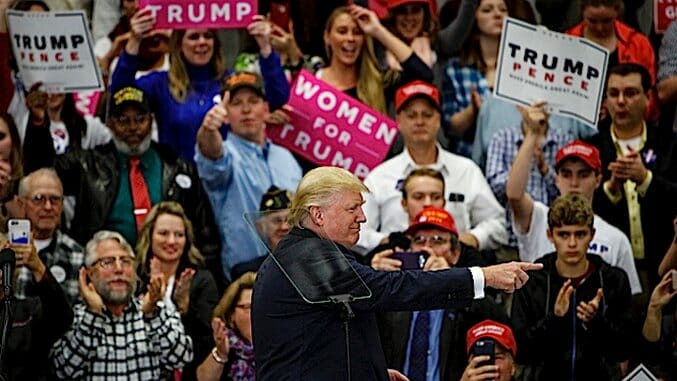The Deep Abyss Inside the Soul of Trump Supporters
Where does it come from, and how do we reach them?
Photo by Sarah Rice/Getty
From time to time you have to drive on a hilly, curvy, rural two-laner with dotted yellow passing zones. And it was a little scary, wasn’t it, when you first realized they put the dotted line on only the flat, straight sections for a reason. When you go up a hill you can’t ever be 100 percent sure someone’s not breaking the law and going the wrong way in your lane coming up the other side — say, a frustrated trucker eager to pass an elderly woman.
But isn’t it also incredible that every time you drive up a hill on a rural two-laner, you essentially admit you’re willing to bet your life that all but a statistically insignificant number of people on the planet are good, sane, happy to abide by sensible and beneficial regulations that a flawed but well-intentioned government made up of flawed but well-intentioned people has put in place, and not hurrying somewhere, like their daughter’s deathbed? And that everyone else is locked up. That’s your bet. Because, if not: Whammo.
We all vote with our lives, hundreds of times a day, despite the solemn testimony of all the drunk driving crosses on the side of the road, in favor of the core truth that mankind is essentially good.
This is not a political piece. I’m sick of the presidential race, shamefully angry about it, and grateful it (should) all be over soon. Instead I want to address something much more significant: myself.
Because like I said, I’m angry and I don’t like it.
We all have an abyss inside. We normally have no idea about what’s actually in another person’s abyss—there’s no evidence of what someone else really wants, believes to be true, judges. We only get glimpses from time to time. But at the same time we all have faith that it’s good stuff in there. We have to practice this faith every day. It’s not explicitly religious, but it’s sacred.
It’s a faith that needs two parts to work. It’s a two-laner. Our interactions along this two-lane road—the infinite part in us and another’s recognition of its vastness and goodness—are what reaffirm us as being human.
I’ve been angry about this election for a long time. I won’t tell you what you already know. I’ll take it on faith you feel the same, no matter which candidate you support. (I will vote for Hillary Clinton.) But even if you’re angry, too, I bet you feel the anger is ugly and strange. As for myself, it took me a long time to realize my anger wasn’t about Trump. It’s not about the racism or sexism or sexual assault or xenophobia or taxes or emails or lies or hate. It’s not anger about anger. And at the center it’s not even really about his supporters, whom I find as incomprehensible as they probably find me.
No: In order to live, we have to assume that deep down all people are good. When we talk about Trump, we’re really talking about each other. The conversation has dragged a secret and sacred part of us out into the light, and we reel when we’re confronted with it.
And the truth of it? I just feel rejected. Like, middle-school level rejected. Not just for my beliefs or values or whatever. I feel rejected as a person. My abyss, what I feel to be my deepest self, has been dismissed. I’m not a person.
Social media, where we literally aren’t human, makes this particularly easy.
-

-

-

-

-

-

-

-

-

-

-

-

-

-

-

-

-

-

-

-

-

-

-

-

-

-

-

-

-

-

-

-

-

-

-

-

-

-

-

-








































